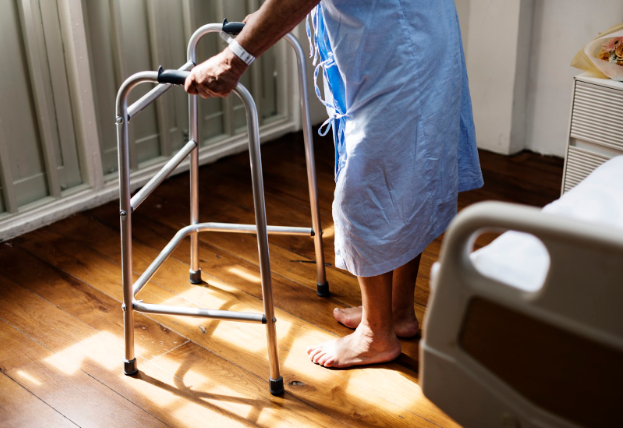How Does Stress Increase Your Chances Of A Stroke?
Scientists have found that people who have heightened activity in the amygdala — the part of the brain commonly linked to stress — are more likely to develop cardiovascular disease. It contributes to aggravating health risks like hypertension, high cholesterol levels, diabetes, obesity, heart problems, etc. These health issues are categorized as ‘high risk factors’ for a stroke. There is a strong link between stress and physical health.
It has been found in a study that stress apparently raises the risk of a Stroke or Transient Ischemic Attack (TIA) by 59%. A TIA is a mini-stroke caused by a temporary blockage of blood flow to the brain.
Additionally, stress leads to developing harmful habits like smoking, which is again a well-established risk factor for a stroke.
How Does A Stroke Happen?
There are two kinds of strokes that could happen!
1. Hemorrhagic Stroke:
Bleeding in the brain causes this kind of stroke. A weak spot in the wall of the vessel can, in turn, cause an aneurysm (bulging of the vessel wall). The vessels can become weak also by chronic high blood pressure and sometimes, they break from the force.
When the vessel breaks, the blood leaks into surrounding tissue. It thereby hampers the passage of oxygen and nutrients to the brain.
2. Ischemic Stroke:
This happens because of blocked arteries, which can be caused owing to a buildup of cholesterol.
It should be noted, that a person who has a comparatively healthy lifestyle and has the right body weight, will be able to handle periodic high stress, without much of a problem.
But, if the stress becomes chronic, it can cause a stroke. For people who already have major health issues, stress can be a highly probable cause for stroke. A person who is genetically predisposed to hypertension, diabetes, obesity etc, is also at a higher risk for stroke caused by stress.

What Exactly Happens During Stress?
Chronic stress results in continuous high levels of cortisol and other stress hormones. This can cause retention of salt, which will then increase the bodily blood pressure. With time, this causes stress on blood vessels.
Stress can also cause blood sugar to increase, due to which the vessels can’t dilate or contract to control blood flow better.
Disruption in sleep cycles can be a result of increased levels of cortisol. Fatigue is the natural progression to this. Thereby, a person might exercise and eat poorly. This is a vicious cycle that can cause any of the various health issues that are responsible for strokes.
How To Find Out If You Are Stressed?
People usually ignore stress and don’t take the necessary steps to deal with it. At the same time, it is impossible to measure the levels of stress — it depends entirely on the tolerance levels of a person!
Some could be stressed owing to the pressures of a job, or some could be facing the stress of dealing with difficult relationships. The extent to which one can handle it determines the severity of stress.
However, you could pay attention to these subtle signs, to know if you are stressed!
- Do your family members and close friends keep asking you if you are stressed?
- Do you find yourself at odds with them, more frequently?
- Have you stopped doing things that used to make you happy?
- Do you find it difficult to fall or stay asleep, compared to your normal patterns?
- Are you delaying getting out of bed, especially if you know the day is going to be stressful?
- Do you find an increase in the number of cigarettes you smoke or has your intake of alcohol suddenly increased?
If you find yourself nodding to most or all of these questions, it might be time to take a step back and look for ways to manage your stress and physical health, before it causes some serious trouble!
How To Get Rid Of The Stress?

Here are some habits you can implement in your day-to-day life to ensure that you aren’t too stressed!
1. Exercise!
People who exercise regularly are less likely to experience anxiety as against people who don’t. Exercise helps release endorphins, which improve your mood and act as natural painkillers. Exercising regularly can also help regulate your sleep patterns, and boost your confidence by improving your overall appearance!
2. Maintain A Healthy Diet!
Make sure your diet includes a healthy mix of green leafy vegetables, water, and less caffeine. High doses of coffee, tea, chocolate and energy drinks can increase anxiety! Test your sensitivity to caffeine before cutting down on it entirely.
3. Laugh… A Lot!
Laughing can help relieve tension by relaxing the muscles. In the long term too, laughter can improve your immune system and mood.
A study among people following a stroke found that people in the laughter intervention group experienced more stress relief than those who were simply distracted.
4. Spend Time With Family and Friends!
Having a rich social life can alleviate stress. Spending time with the people you love releases oxytocin that is a natural stress reliever! Yes that is difficult right now, but connect with them in whatever way you can find. Phone, video calls, texts or even the old fashioned letter.
5. Learn To Say No!
Not all factors causing stress are within your control. But, you can always try to be selective of the responsibilities you take on, especially when it comes to work. Taking on more than you can handle, and then trying to juggle it all successfully, can cause a lot of stress, and can have a detrimental effect on your physical health.
6. Be Mindful Of Procrastination!
Prioritise your tasks — and stay on top of it! Prepare a to-do list every day, and give yourself realistic deadlines. This way you can avoid the last-minute stress of trying to get too much done in a short period!
7. Cultivate Hobbies!
Having hobbies can give you the much-needed break from the routine, and refresh your mind. Often, distraction is the best remedy for stress. Listening to music, some light reading, painting, or something you enjoy doing, can work wonders for your stress levels!
Do not deprive yourself of anything, but make sure your body and mind do not fall into the trap of chronic stress. If you feel that the stress you face in your life is bogging you down, seek help. Pronto. You can lower the risk of getting a stroke by about 24%!! I know how important it is to look after your emotional health, and how it impacts your physical health. A few years ago I was experiencing high levels of stress and anxiety, did nothing about it. I had a stroke. Don’t leave it too late to do anything about it.
Contact me to find out how to reduce your stress and anxiety and improve your physical health.






